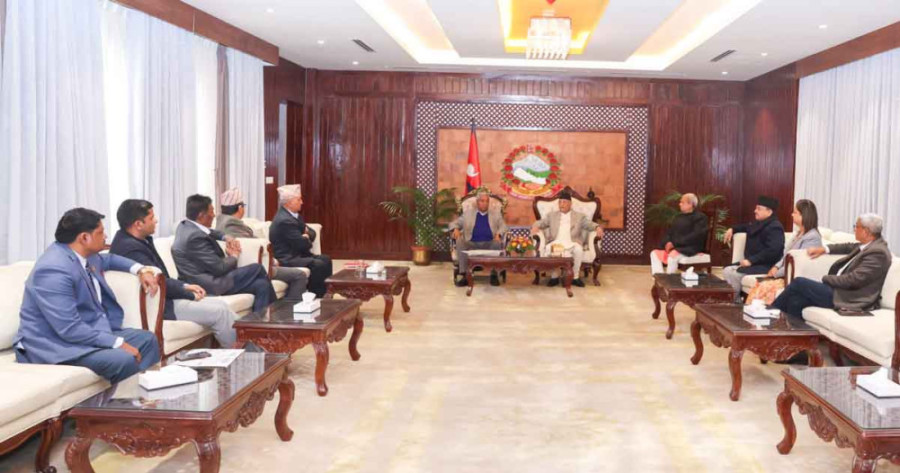Politics
Ordinances, barring disputed one on land, set for upper house
The government decides to table five ordinances on Tuesday, after consulting JSP-Nepal chief Upendra Yadav.
Anil Giri
A meeting of the ruling parties on Saturday decided to table five of the six ordinances in the National Assembly on Tuesday after agreeing to drop the disputed land-related ordinance.
“Following strong protests and opposition within the ruling alliance, the government has decided to shelve the plan to table the ordinance related to land. But five other ordinances will be tabled in the National Assembly on Tuesday,” said Home Minister Ramesh Lekhak.
Two ruling parties—the Janata Samajbadi Party-Nepal (JSP-N) and the Loktantrik Samajbadi Party (LSP) led by Upendra Yadav and Mahantha Thakur, respectively—had opposed the land ordinance. Some individual leaders within the Nepali Congress and the CPN-UML, the two ruling parties, are also said to be unhappy with its content.
“We also spoke to Upendraji, and with Raj Kishor Yadav, vice chairman of the JSP-N, during the meeting of the ruling parties. JSP-N chair Yadav was absent in person, but LSP chair Thakur was present,” Lekhak said.
“Both [Upendra and Raj Kishor] were out of Kathmandu, so they could not attend. But as soon as they return, we will reach an understanding and table the ordinances in the upper house.”
The government in January had issued five ordinances—Ordinance to Amend Some Nepal Acts Related to Good Governance Promotion and Public Service Delivery; Economic Procedures and Financial Responsibility (first amendment) Ordinance; Privatization (First Amendment) Ordinance; Ordinance to Amend Some Nepal Acts Related to Economic and Business Environment Improvement and Investment Promotion; the Ordinance to Amend Some Nepal Acts Related to Land. And before this, in December, it had issued an ordinance to amend the Cooperatives Act.
As per the constitution, ordinances must be approved within 60 days of the start of a House session and be replaced by replacement bills.
The government did not consult other ruling partners while formulating the land ordinance, said Min Bishwakarma, head of publicity department of the Congress. “That is why the ordinance related to land is not going to be approved in its current form.”
“The government has a majority in the House of Representatives, but it does not command a majority in the National Assembly, so the government had to reconsider its approach. Had it consulted other ruling parties, the situation today would be different. That’s also why the government is now in consultations with other ruling parties,” said Bishawkarma.
Some ruling parties like JSP-N and LSP have also expressed their reservations about the content of other ordinances. They have been calling for revisions to certain provisions before the replacement bills are brought.
“Some provisions can be revised in the replacement bills,” Bishawkarma said
Earlier, President Ramchandra Paudel had also expressed his reservations over the land ordinance and delayed it by a few days before giving it his stamp of approval.
“While presenting the replacement bill for the land ordinance, we will reach an agreement with all parties,” said Congress leader and Home Minister Lekhak.
Likewise, the meeting of the ruling parties agreed to form a taskforce to amend the constitution. The taskforce will study and recommend possible amendments.
While coming together to form the government in July last year, the Congress and the UML had reached a seven-point deal, whose main focus was to amend the constitution in consultation with relevant stakeholders.
“We will consult all political parties before amending the constitution,” said Lekhak.
But amending the constitution remains a Herculean task for the ruling parties. For this, they need to have two-thirds support in both houses of parliament. Also, if the amendments have anything to do with the provinces, approval of the respective provinces is essential.
The main opposition CPN (Maoist Centre) has been accusing Prime Minister Oli of attempting to reverse the current political system.
“Oli-ji is not happy with the way the rights have been ensured for women, Dalits and Janajatis,” said Maoist Centre chair Pushpa Kamal Dahal on Friday. “Even during the constitution-writing process, he had expressed reservations about provisions like federalism and proportional representation in the House of Representatives which ensures the rights of women, Dalits and Janajatis.”
Not only opposition parties, even some ruling party leaders have questioned the process of constitution amendment.
“Constitution amendment along the terms and conditions of the Congress and the UML is not possible,” said UML lawmaker, Raghuji Pant, “especially at a time the ruling parties don’t have the numbers in the upper house.”
Any constitution that does not undergo timely amendments will cease to exist, he said. “So the national charter must be amended even to ensure the survival of the current government system,” Pant added.




 17.12°C Kathmandu
17.12°C Kathmandu















